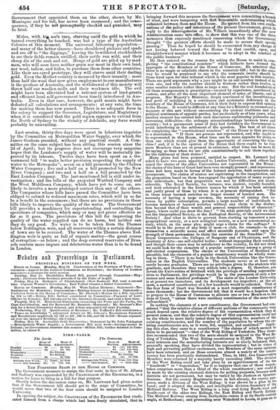Last session, thirty-five days were spent in laborious inquiries by
the Committee on Metropolitan Water Supply, over which Sir James Graham presided, without any practical result. A Corn- =Wee on the same subject has been sitting this session since the 2d of April • but its progress does not encourage very sanguine hopes that the Londoner's supply of water will be materially im- proved by its labours. Twelve days have been spent on a Go- vernment bill "to make better provision respecting the supply of water to the Metropolis"; seven on a bill promoted by the Chelsea Water Company ; five and a half on a bill promoted by the New River Company ; and two and a half on a bill promoted by the East London Company. The last-mentioned bill is still under in- vestigation; and the bills of the projected Watford Company and the West Middlesex Company, which have yet to come on, are likely to involve a more prolonged contest than any of the others.- The Companies whose bills have passed the Committee have been obliged to submit to reduced maximum rates, which will in so far be a benefit to the consumers; • but there are no provisions in those bills likely to improve the quality of the water. The Government bill provides a machinery for superintending and controlling the operations of companies, which may or may not prove effective so far as it goes. The provisions of this bill for improving the quality of the water supplied can do no harm, but neither can they do any good. No water is to be taken from the Thames below Teddington weir, and all reservoirs within a certain distance of town are to be covered. The water of the Thames above Ted- dington weir is quite as full of organic matter—the great source of corruption—as below ; and the deep covered reservoirs of Brus- sels contain more impure and deleterious water than is to be found in London.


























 Previous page
Previous page